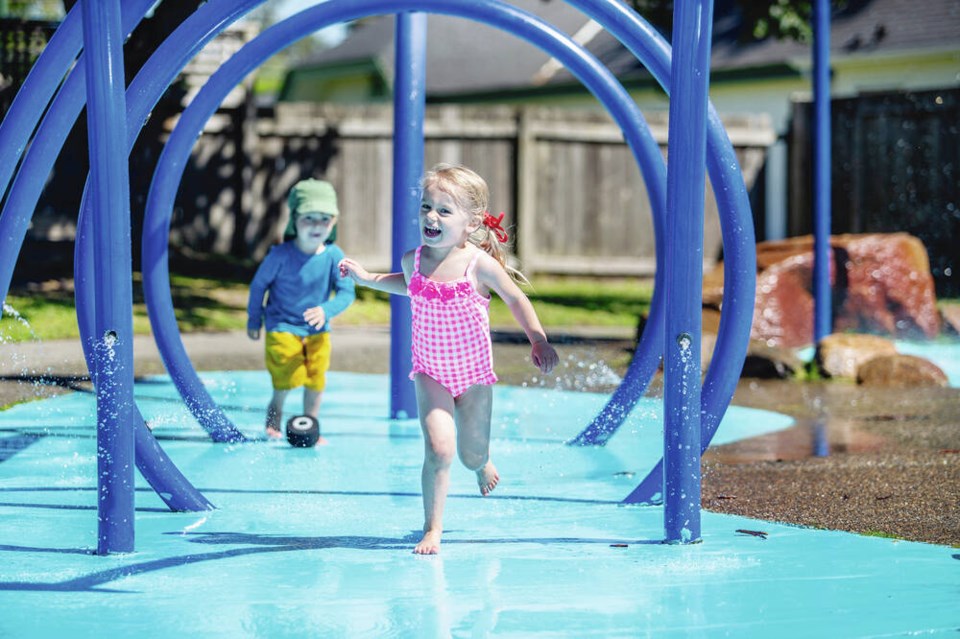Spray stations and air-conditioned community centres are at the ready as Vancouver Island braces for a heat wave.
Environment Canada has put warnings in place for most of B.C., including Greater Victoria, the Southern Gulf Islands, and inland and eastern Vancouver Island, as a “strong ridge of high pressure” is expected to bring a heat wave to the province starting today.
The warnings cover an area from the inner south coast, including Victoria and Metro Vancouver, to the Okanagan, and as far north as the Bulkley Valley and Terrace and Kitimat on the northern coast.
The weather office says highs in many areas away from the water could reach the upper 30s, and could nudge 40 C in Kamloops, Vernon, the Okanagan and Boundary regions and much of the Kootenay.
With temperatures as high as 30 C in Victoria, 34 in Nanaimo and 35 in Port Alberni in the forecast, advocacy groups and local governments are reminding the public to take precautions. Wednesday to Friday are forecast to be the hottest days, with a “slow cooling trend” expected by the weekend. The late afternoon to the early evening will be the hottest part of the day, while the coolest time will be near sunrise.
“That heat might be lasting until Friday,” said Dr. Shannon Waters, Island Health medical health officer. “We would be looking at having some calls co-ordinated with specific regions that meet the heat-warning criteria.”
The provincial government’s new B.C. Heat Alert and Response System operates on two categories of heat events: Heat warnings, which are launched for Vancouver Island after two or more days of temperatures of at least 29 C, and extreme heat emergencies, triggered when the heat warning criteria has been met and temperatures are expected to keep rising for three or more days.
During an extreme heat emergency, the province will issue alerts through the national public alert system, the same process in place for tsunami and wildfire warnings.
About 620 people died from heat-related deaths in B.C. during record high temperatures in June 2021. A B.C. coroners report found that more than half of those who died lived alone, and 67 per cent were 70 years of age or older.
The B.C. Office of the Seniors Advocate recommends family, friends and neighbours to check in on vulnerable seniors.
“Please check regularly — in person if possible — on elderly family members and friends to make sure they can stay cool and hydrated,” said seniors advocate Isobel McKenzie. “An extreme heat emergency may require people to move family members to a cooling centre or get an air conditioning unit into their home.”
Others at risk include infants and children, people who are pregnant, people with pre-existing health conditions, substance use disorders, limited mobility or mental illness, and those who are marginally housed or work in hot conditions.
The health authority is reminding people to check in on vulnerable friends and family who live alone.
“Identify people who may be at high risk for heat-related illness. If possible, help them prepare for heat and plan to check in on them.”
Hunter Boucher, director of operations for Landlord B.C., which represents about 150,000 rental units in the province, said the organization takes the matter seriously and is urging property managers to check on tenants who may be vulnerable.
This can include going into a unit to ensure the tenant is managing in the heat and ensuring blinds are down on windows.
“Things like that are really necessary in keeping their personal space cool,” Boucher said, adding that those tenants will know that someone is going to check in on them from time to time.
Several municipalities are preparing cooling centres for residents.
In the event of an extreme heat emergency, the City of Victoria, for example, will activate cooling centres at the Cook Street Community Centre and Save-On-Foods Memorial Centre and 11 misting stations at locations around the city. The misters were built to be attached to fire hydrants, said Tanya Patterson, Victoria’s emergency program co-ordinator.
“With the resources we have in place, we feel quite prepared, especially compared to last year,” Patterson said.
The B.C. Centre for Disease Control recommends finding a cooler space in your home if there is one, and preparing to sleep there, if necessary. It’s also recommended to locate a nearby location with air conditioning such as a community centre or library.
If experiencing heat exhaustion — which may cause a headache, sweating, thirst, dark urine or rapid breathing — health experts recommend decreasing activity, moving to a cool space and drinking plenty of water.
Signs of heat stroke, which calls for immediate medical attention, include a very high body temperature, fainting, confusion and lack of co-ordination, hot red skin and no sweating.
For more information on preparing for heat events, go to bccdc.ca.
— With files from Carla Wilson and The Canadian Press
>>> To comment on this article, write a letter to the editor: [email protected]



